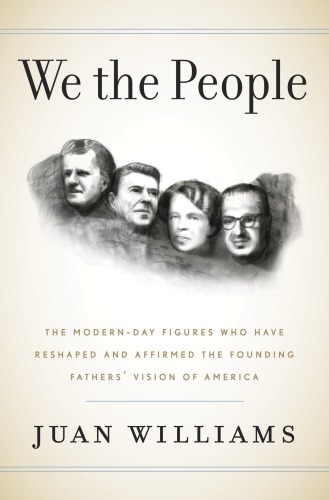
We the People
The Modern-Day Figures Who Have Reshaped and Affirmed the Founding Fathers' Vision of America
کتاب های مرتبط
- اطلاعات
- نقد و بررسی
- دیدگاه کاربران
نقد و بررسی

May 23, 2016
In this blend of political history and biography, Fox News analyst Williams (Muzzled: The Assault on Honest Debate) marvels at how much America has changed since its founding. Attempting to explain how America has transformed, Williams calls for the creation of a new "Founding Family," a gallery of 20th-century figures central to the issues that define modern America: debates over gun control and environmentalism, the rise of the Religious Right, or the state of postâCivil Rights Era race relations. In the lively profiles that follow, Williams reaches across the aisle, embracing liberal and conservative heroes alike; on this new Mount Rushmore, one sees Milton Friedman and Edwin Meese alongside Betty Friedan and Jesse Jackson. But Williams's inclusive bipartisanship, however theoretically admirable, precludes practical critique and flattens nuance. When it comes to divisive issuesâimmigration, policing, labor unions, Robert Moses's urban planningâWilliams tells readers that America has changed "for better or worse," as if all development is neutral and all of his subjects are worthy of celebration. In crafting his founding family, Williams misunderstands why Americans invoke the founding fathers in the first place: not because they created the nation, but because their ideals inspire citizens to forge a better one. Agent: Eric Lupfer, William Morris Endeavor.

January 15, 2016
Prizewinning journalist and Fox News political analyst Williams (Muzzled: The Assault on Honest Debate, 2011, etc.) identifies more than two dozen individuals who helped shape modern America. In brightly written chapters detailing the lives and actions of "great men and women who forged the nation we have today," the author traces extraordinary changes of the 20th century that would have shocked the Founding Fathers, who lived in a smaller, far different society. Members of the new "founding family," as he calls these modern change-makers, include jurists Earl Warren and Thurgood Marshall (racial equality), economist Milton Friedman (free markets), builders Robert Moses and William Levitt (the urban and suburban landscapes), George Meany (labor), Billy Graham (the Christian right), and Henry Kissinger (diplomacy). Some sparked social-change movements through books, such as Betty Friedan (The Feminine Mystique) and Rachel Carson (Silent Spring). Others are little known, like bureaucrat Robert Ball, a longtime Social Security official who redefined and expanded that program to define health care as a fundamental right; and Harry Hay, founder of the first U.S. gay rights group. In each instance, Williams draws on secondary sources to provide a balanced view of people and issues, often noting the "for better or worse" aspects of massive societal changes, such as the rise of the National Rifle Association under actor Charlton Heston. The author's insistence on comparing modern change-makers to the Founding Fathers, however, is a bit of a stretch. While it allows him to make effective comparisons between American life past and present, it has the effect of elevating many individuals, such as Bill Bratton, father of data-driven policing, and Gen. William Westmoreland, who helped reshape the U.S. military, to company to which they do not belong. Perhaps most interesting is Jack and Ted Kennedy's work on 1965 immigration reform, which has literally changed the face of America. Notably absent are technology and business figures. A solid overview for general readers.
COPYRIGHT(2016) Kirkus Reviews, ALL RIGHTS RESERVED.

March 15, 2016
In his latest work, notable journalist Williams (Eyes On the Prize) selects some two dozen individuals from the 1800s and 1900s who have contributed to expanding U.S. democracy. The author is well suited to undertake this task, and his case studies are rich with data that supports his thesis. Roughly half of the chapters deal with "liberal" icons who have extended rights in the United States: John F. Kennedy, Earl Warren, Thurgood Marshall, Martin Luther King Jr., Eleanor Roosevelt, Betty Friedan, and Rachel Carson. Other sections profile "conservative populists" Billy Graham, Henry Kissinger, Richard Nixon, and Charlton Heston. A few straddle these camps, such as labor leader George Meany and politician and former presidential candidate Barry Goldwater. In other words, the researched portraits are not one-sided hagiographic or hatchet jobs. The author aims to understand the motivation of the individual and their contribution to contemporary culture. VERDICT Williams will captivate open-minded readers with this provocative "rating-game" that updates historian Richard Hofstadter's classic The American Political Tradition. A highly recommended history.--William D. Pederson, Louisiana State Univ., Shreveport
Copyright 2016 Library Journal, LLC Used with permission.

March 15, 2016
The enormous changes in American society over the past five decades in immigration, civil rights, and other sociological realms inspired high-profile commentator Williams (Muzzled, 2011) to wonder what the founding fathers would have thought about our times. Williams imagines their reactions as he provides biographical sketches of pivotal figures who played leading roles in various movements and policy developments. Readers will recognize most of them, and the issues they represent continue to be passionately argued in the public square. Take immigration for example: contemporary debate stems directly from reforms engineered by Senator Edward Kennedy in 1965. Equal rights for women (personified by Betty Friedan), minorities (Martin Luther King Jr.), and the LGBTQ community (Harry Hay) would have puzzled the founders, avers Williams. The federal government's expansion since the 1960s prompts the least-known subject, a Social Security bureaucrat named Robert Ball. With environmentalist Rachel Carson, human rights advocate Eleanor Roosevelt, free-market guru Milton Friedman, evangelist Billy Graham, and right-to-bear-arms advocate Charlton Heston, Williams combines personalities and issues across the political spectrum in an appealing and accessible volume.(Reprinted with permission of Booklist, copyright 2016, American Library Association.)

























دیدگاه کاربران